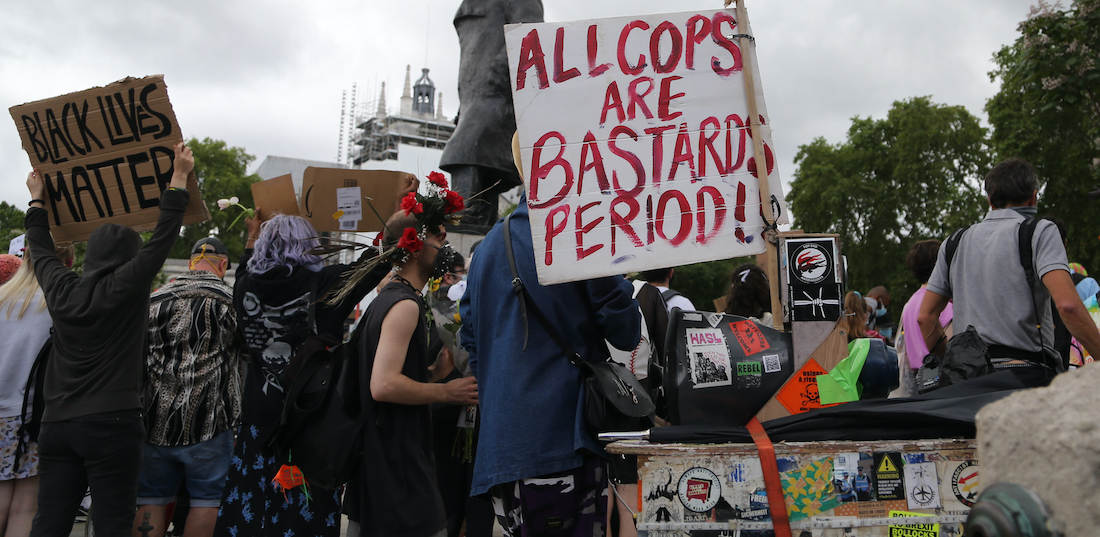As our country is engulfed in the flames of discord, our task is more than merely reporting on events, calling for an end to racism, or making emotional appeals to unity. As Thomas Aquinas reminds us, wrongdoing follows when emotions disobey reason’s commands. When our passions fetter reason and make it their slave, we cannot see how others are using us as pawns in an ideological game.
Against the reign of passions, reason acknowledges two principles—both included by Aquinas as a second set of the principles of practical reason: 1) The Golden Rule (“Do unto others as you would have them do to you”); and 2) Do not answer injury with injury.
Yet it is so much easier to let appetites run wild, and allow injustice and violence to masquerade as justice and righteousness. What we see in many cities today—the looting, burning, assault, and killing—is what we get when we misunderstand justice and become instruments in the hands of ideologues whose task is to inflame and destroy. Their understanding of human advancement depends on a dialectical view of history—that the only way to advance is to burn down the present order. What can be better for ideologues than to utilize real injustice as a means of channeling anger and leveraging the manpower of those who otherwise would never endorse their political agenda?
Doesn’t it feel right to say, as Antifa militants do, that “we don’t debate with fascists, we just defeat them”? To state that “we don’t reform the present order—irreformable as it is—we just smash it to pieces”? The utopian vision informing this radicalism cannot admit any other response than rabid activism and destruction. According to Antifa activists, anyone who fails to realize the obvious truth of their case must be acting in bad faith. Their destruction is the only solution, since they are denying my humanity and enabling forces that impede my self-actualization and the affirmation of my dignity.
That is the logic of the radical ideologue. Its enemy is rational dialogue and democratic compromise.
As ideologues are both revolutionaries and patient soldiers, they will wreak havoc now and lay in wait afterwards, like a pack of hyenas stalking wounded prey. In the process, they have changed our collective consciousness to accept their analysis of history, which will facilitate and ignite the next round of violence. Those challenging their paradigm will no longer be deemed reasonable or decent: After all, we need to do something. When the flames momentarily subside, we see their dialectics have won the day.
This is Rousseau and Hobbes fused with the distortion of human nature perpetrated by Marx. Just over a century before Hobbes, Jean-Jacques Rousseau affirmed that human nature is essentially good, and that people were naturally capable of happiness and peaceful coexistence well before the development of the modern state. Man is good, and society corrupts him. In the Discourse on the Origin of Inequality, Rousseau describes the state of nature as one where man is self-sufficient, worry-free, and cultivates his plot of land freely. Peace suffuses this pre-civilizational state. But one day, someone places a stake to divide the land, and property is born – and with it the downfall of humanity.
In 1651, at the opposite end of the intellectual spectrum, Thomas Hobbes famously wrote that our natural condition outside the authority of a political state was “solitary, poor, nasty, brutish, and short.” Instead, we’re naturally selfish and in need of guidance to avoid descending into vicious competition over scarce resources. That being our natural condition, Hobbes argued, we must submit ourselves to an authoritative body with the power to enforce laws and resolve conflicts.
Hobbes and Rousseau represent opposing poles in the great questions of human nature. However, their positions are forced into compatibility in the thought of Karl Marx and, later, Vladimir Lenin. For Marx, the nature of the human species was not obvious in every individual, instead being determined by a specific social and historical formation, with some aspects being biological. The very nature of the human person is collectivized in Marx, thus avoiding Rousseau’s question of the place of society in the discussion of what impedes individual human flourishing. Whether everyone is naturally good is irrelevant, because what is important is the collectivized economic structure. However, with Rousseau, Marx indicts the social order. Capitalism turned us into enemies who endlessly compete with one another, and private property is poison.
With Hobbes, Marx and Lenin affirmed the need for a strong collective vanguard to push the march of socialism forward. The collectivized self needs guidance from an enlightened corps to desire the ultimate destruction of the capitalist social order—and to be exploited to accomplish that task. The goal is to erase the present order of the West and, after an inevitable clash, to erect a new order, with its own tensions and antagonisms, in its place. After all, for Marx, violence is the great instrument for progress.
This guiding force within the group cannot evolve organically; it needs to be imposed. As Lenin taught, the peaceful, economic evolution of capitalism into socialism is impossible. There is the need for a single-minded group of revolutionaries that rises from the more-or-less chaotic mass of the class as a whole. The groups now leading the looting and burning are those whose hearts are sewn with the thread of vanguardism. They have found that all-encompassing truth that we are racial victims, and the present, intrinsically racist order demands immediate eradication.
In Marx, the key was class; for these neo-Marxists it is the irreducible concept of race. From systemic racism theory, to “whiteness” studies, to Critical Race Theory, they have been able to enumerate the means of our dispossession and to advance the dialectic.
Extremism emerges from believing that we have found the truth, the one all-embracing solution, which is never reform-oriented but merely radical. Once we have found this exhaustive answer, it is imperative to actualize it, both in education and in action. How can we be true to ourselves if we do not acknowledge the priority of activism?
When we reach this point, we have been swallowed by the dictatorship of appetite. The last step is to complete the scorched-earth campaign. The dictatorship of appetite begins with imperfect reality, escapes into emotional appeals, is directed by the ideological aims of the few, and ends up in unbridled passion and destructive action. We are seeing the dictatorship of appetite in full swing as you read. There is no doubt that a real injustice was recently committed against George Floyd, and other injustices have been committed against other citizens. What is not real is the interpretation at the base of that reality.
The early civil rights movement was not infected with the seeds of dialectical materialism as its interpretive model of black reality. The movement was imbued with a reformist embrace of the American ethos and a natural law understanding of the human person and the social order. Early in the movement, Martin Luther King Jr. approached the microphone of Holy Street Church in Montgomery, Alabama, to proclaim black dignity and demand a generational change. “When the history books are written in future generations,” he declared, “the historians will have to pause and say, ‘There lived a great people — a black people — who injected new meaning and dignity into the veins of civilization. This is our challenge and our overwhelming responsibility.” The present generation has betrayed such honorable aims.
(Photo credit: Salci / Shutterstock.com. Editorial use only.)

